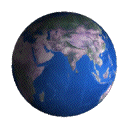What do Muslims do on 'Eid?
Muslims are encouraged to dress in their best clothes (new if possible) and to attend a special Eid prayer that is performed in congregation at mosques or open areas like fields, squares etc. When Muslims finish their fast at the last day (29th or 30th Ramadan), they recite Takbir (Arabic audio clip with English meaning).
Allahu akbar, Allahu akbar, Allahu akbar
الله أكبر الله أكبر الله أكبر
la ilaha illa Allah
لا إله إلا الله
Allahu akbar, Allahu akbar
الله أكبر الله أكبر
wa li-illahi al-hamd
ولله الحمد
God is the Greatest, God is the Greatest, God is the Greatest
There is no deity but God
God is the Greatest, God is the Greatest
and to God goes all praise
The Takbir is recited after confirmation that the moon of Shawwal is sighted on the eve of the last day of Ramadan. It continues until the start of the Eid prayer. Before the Eid prayer begins every Muslim (man, woman or child) must pay Zakat al Fitr, an alms for the month of Ramadan. This equates to about 2 kg of a basic foodstuff (wheat, barley, dates, raisins, etc.), or its cash equivalent, and is typically collected at the mosque. This is distributed to needy local Muslims prior to the start of the Eid prayer. It can be given at any time during the month of Ramadan and is often given early, so the recipient can utilise it for Eid purchases. This is distinct from Zakat based on wealth, which must be paid to a worthy charity.
The Eid prayer (salah) is followed by the khutba (sermon) and then a prayer (dua') asking for forgiveness, mercy and help for the plight of Muslims across the world. It is then customary to embrace the persons sitting on either side of oneself as well as ones relatives, friends and acquaintances.
Muslims spend the day thanking the Creator for all their blessings, as well as simply having fun and enjoying themselves. Children are normally given gifts or money.
Allahu akbar, Allahu akbar, Allahu akbar
الله أكبر الله أكبر الله أكبر
la ilaha illa Allah
لا إله إلا الله
Allahu akbar, Allahu akbar
الله أكبر الله أكبر
wa li-illahi al-hamd
ولله الحمد
God is the Greatest, God is the Greatest, God is the Greatest
There is no deity but God
God is the Greatest, God is the Greatest
and to God goes all praise
The Takbir is recited after confirmation that the moon of Shawwal is sighted on the eve of the last day of Ramadan. It continues until the start of the Eid prayer. Before the Eid prayer begins every Muslim (man, woman or child) must pay Zakat al Fitr, an alms for the month of Ramadan. This equates to about 2 kg of a basic foodstuff (wheat, barley, dates, raisins, etc.), or its cash equivalent, and is typically collected at the mosque. This is distributed to needy local Muslims prior to the start of the Eid prayer. It can be given at any time during the month of Ramadan and is often given early, so the recipient can utilise it for Eid purchases. This is distinct from Zakat based on wealth, which must be paid to a worthy charity.
The Eid prayer (salah) is followed by the khutba (sermon) and then a prayer (dua') asking for forgiveness, mercy and help for the plight of Muslims across the world. It is then customary to embrace the persons sitting on either side of oneself as well as ones relatives, friends and acquaintances.
Muslims spend the day thanking the Creator for all their blessings, as well as simply having fun and enjoying themselves. Children are normally given gifts or money.









<< Home